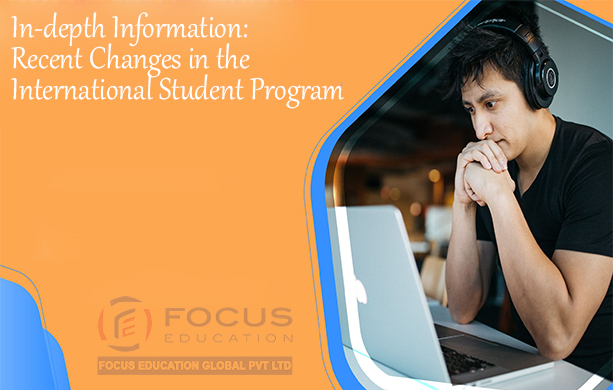In-depth Information: Recent Changes in the International Student Program
Further information was released by IRCC on Feb 5th, to give more clarification regarding the announcement of an intake cap on new international study permit applications and additional changes. While international students greatly enrich Canada’s campuses, communities, and economy, recent years have seen unsustainable growth in the International Student Program. These reforms aim to foster sustainable population growth in Canada, enhance system integrity, and ensure a positive experience for International Students Studying in Canada.
1. Cap and Attestation Letter:
Starting from January 22, 2024, new international students who want to study at a college or undergraduate level in Canada must include a document called a Provincial Attestation Letter (PAL) with their application for a study permit. This letter shows that the student is part of a limit set by a province or territory for international students. If an application doesn’t have this letter, it will be sent back by Immigration, Refugees and Citizenship Canada (IRCC), unless there’s an exception.
Provinces and Territories need to have a plan by March 31, 2024, for giving out these PALs. The Canadian government is also figuring out how the certificat d’acceptation du Québec (CAQ) from Quebec could be used as a PAL. If your application was sent to IRCC before January 22, 2024, or if you already got approval for a study permit and are planning to come to Canada soon for your program, you don’t need to do anything else because of this new limit.
If you’re wondering about who needs a PAL and who doesn’t, don’t worry Focus Education is here to help clarify.
Who required a provisional attestation letter (PAL)?
• Most applicants for post-secondary study permits
• Most of the students in non-degree granting graduate programs, such as certificate programs and graduate diplomas
Who does not require a provisional attestation letter (PAL)?
• Master’s or doctoral degree students.
• Primary and secondary school students.
• In – Canada study permit and work permit holders (which includes study permit holders applying for an extension)
• Exchange or visiting students.
• In–Canada family members of study permit or work permit holders.
• Students whose application was received before 22nd Jan 2024.
2. Extended Post-Graduation Work Permit for Master's Degree Graduates: Key Updates
Recognizing the exceptional potential of graduates from master’s degree programs to excel in Canada’s job market and potentially transition to permanent residence, adjustments have been made to the Post-Graduation Work Permit (PGWP) duration.
Effective February 15, 2024, graduates of master’s programs lasting less than two years, meeting all other PGWP criteria, will be eligible for an extended 3-year work permit. This modification aims to provide ample opportunities for acquiring the necessary Canadian work experience for permanent residence applications. For programs other than master’s degrees, PGWP duration will remain aligned with the program’s length, capped at a maximum of 3 years.
Who is qualified for a longer post-graduation work permit (PGWP)?
If you finish a program that’s at least two years long at a designated learning institution where you can get a PGWP, you can get a PGWP for three years. Also, if you finish a master’s degree program that’s less than two years long, you can get a three-year PGWP.
3. Updates on PGWP Eligibility: Public-Private College Partnerships
In some provinces, public colleges allow private colleges to use their curriculum. This means students go to a private college but get a diploma from a public one. People are worried about the education quality and lack of help for students at these colleges. The Auditor General of Ontario is also worried about not checking if the programs and services are good enough.
Because of this, IRCC has decided to limit work permits for students at these colleges. They think that if students can’t get work permits, fewer international students will go to these colleges
Who can get a PGWP after finishing a program at a public-private partnership college?
International students who are already enrolled can still get a PGWP if they meet all the other requirements.
Who can’t get a PGWP after finishing a program at a public-private partnership college?
New students joining this type of program won’t qualify for a post-graduation work permit.
4. Changes in Eligibility for Spousal Open Work Permits: What You Need to Know
Soon, the rules for open work permits for the husbands, wives, or partners of international students will be changed.
Who can qualify for an open work permit?
Only spouses and common-law partners of students in graduate (master’s and doctorate) and professional degree programs can apply for an open work permit. After the changes take effect, spouses and common-law partners of international students who want to extend their current work permit will still be eligible for this type of permit.
Who won’t be able to get an open work permit?
The spouses and common-law partners of international students studying at other levels, such as undergraduate and college programs, won’t qualify for an open work permit anymore unless they already have one under this specific category.
Therefore, the aforementioned details provide a comprehensive overview of the Recent Changes in the International Student Program. For further clarification or assistance regarding these updates, we encourage you to reach out to our experts at Focus Education. Our team is well-equipped to guide you through the necessary steps, whether you require insights into the policy’s implications or assistance in pursuing studies abroad. We offer tailored support, including options for Studying abroad with or without IELTS. To access our comprehensive assistance, visit us at Focus Education and connect with our dedicated professionals today.



